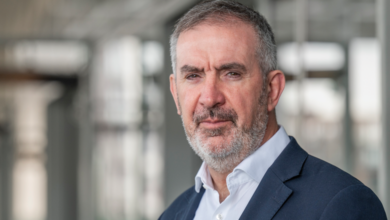Developing a digital capability framework for the HSE

Following the publication of an All-Ireland Digital Capability Framework for Health and Social Care, eolas Magazine sits down with key stakeholders involved in creating and delivering the broader framework across the HSE.
Initially adapted for nursing and midwifery in Ireland – north and south – the All-Ireland Digital Capability Framework for Health and Social Care has its roots in the delivery of Australia’s National Nursing and Midwifery Digital Health Capability Framework, led by the Australian Digital Health Agency and developed by the Australasian Institute of Digital Health.
The evolution of the framework stems from work undertaken by Loretto Grogan, the HSE’s National Chief Nursing and Midwifery Information Officer, to carry out a scoping review of successfully implemented international competency and capability frameworks, initially aimed at improving workforce capabilities for the HSE’s nursing and midwifery workforce.
Collaboration with the Australian Institute of Digital Health, which shared its framework and learning from its own journey, culminated in the creation of an all-island competency framework for nursing and midwifery. This was followed by the completion of an all-island consultation and subsequent approval. In turn, a similar consultation was held by the National Health and Social Care Professions Office, aimed at the general health and care workforce.
Implementing improved digital capability goes beyond the deployment of new technologies or devices. The evolution of technology in health and care also requires a workforce which recognises and understands the significance of socio-technical dimensions in digital health implementation.
Grogan, the HSE’s National Chief Nursing and Midwifery Information Officer, believes that Digital for Care:
A Digital Health Framework for Ireland for 2024 to 2030, and the HSE’s corresponding Digital Health Strategic Implementation Roadmap has the potential to be “the biggest and most effective driver of change and improvement for better patient outcomes across the health system in Ireland”. The all-Ireland framework, she explains, is a key enabler of this ambition.
“It is about having a coherent suite of digital health solutions underpinning and supporting our overall vision for integrated, patient-centred care, population health planning and more effective and safe delivery of health services. Patients and health professionals will have ready access to the right information about the right patient in the right place at the right time which will enable better decisions to be made,” she explains.
The framework comprises five domains, which sit within the context of health and care professional roles, workplace settings, and the professional standards that apply to practice. These domains are:
1. digital professionalism;
2. leadership and advocacy;
3. data and information quality;
4. information enabled care; and
5. technology.
The framework recognises the unique digital health capabilities of health and care staff across all disciplines, while also acknowledging evolving expectations around digital health, much of which were catalysed by the Covid-19 pandemic.
Niall Halliday, the HSE’s National Chief HSCP Information Officer explains: “The Framework is intended to empower individuals, their teams, and organisations. What is relevant to one individual in a particular setting may not be relevant to another. Health and care staff may be at a learning or ‘formative level’ in some domains while ‘proficient’ – in other words, leading or championing – in others.
“At one end of the spectrum, there is a level below ‘formative’ for colleagues who need foundational training and literacy in digital health. At the other end – there will be a need for specific high-level consideration around leadership for staff with specific needs beyond ‘proficient’ in some domains.”
“One of the initiatives being undertaken… is the development of a learning passport, which will be carried through individual’s digital capability journey.”
Niall Halliday
Halliday says that the development of a governance structure to effectively manage the broad and ranging piece of work, is underway, with priority currently being given to the foundational elements of digital education.
“One of the initiatives being undertaken in partnership with the HSE’s digital team is the development of a learning passport, which will be carried through individual’s digital capability journey,” he details.
This initiative comprises three foundational modules:
1. digital clinical safety;
2. data literacy; and
3. digital health literacy.
“They have been developed in partnership with our colleagues across the HSE, who have been brought together in the form of expert review groups for the content and development.
“The design and development of the digital products, and the modules has been finalised within the HSE, utilising the expertise that we have within the technology and transformation office. Overall, it has been a tremendous collective effort.”
Halliday says that with the clinical safety module nearing completion, all three foundational modules are expected to go live in Q1 2025.
Expanding on this, Grogan explains that progress will be underpinned by the experience garnered through the delivery of the nursing and midwifery framework. “Alongside the framework, we developed digital health competency standards which pervaded all of the education settings. What it has meant is that all our undergraduate nurses, and midwives, will have digital health built into their undergraduate programmes, and that competency framework is built directly in partnership, and directly from the framework with our regulatory body.”
Elaine McLoone, the HSE’s Communications Lead for Digital Care described the implementation of the framework suggests that HSE staff will take comfort from their centricity to the framework.
“The framework builds on our approach of breaking down the digital divide for our health and care workforce, identifying gaps, and deploying learning and training solutions to bridge these. This aligns with work already being undertaken across the HSE.”
Halliday stresses that the framework is geared towards enabling the digital capabilities of the whole workforce, not simply clinicians.
“The foundational modules have been developed with the intention of bringing everyone along at the same pace and ensuring that everyone has that foundation ahead of the increased deployment of digital solutions within the HSE.
“Further development will emerge via the development of new pathways, tailored for relevant professions. The idea of creating stepping stones, of building people’s competencies and capabilities, so that they are accessible to them at a time and a place when they need it, is where we want to get to.”
Outlining her vision for implementation in 2025, Grogan acknowledges that: “Healthcare professionals work in an increasingly digital environment, with the associated benefits becoming central to the delivery of patient-centred care. Improving overall digital capability, therefore, is a key enabler of leveraging digital health technologies effectively and safely.
“Our priority is to have a significant proportion of the workforce engaged in the learning passport initiative in the year ahead, with an ambition to have most, if not all, of the workforce at a foundational level by the end of 2025.”





